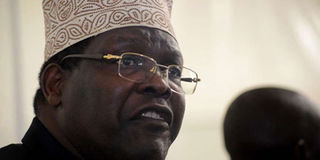The Miguna Miguna story and what the elders might have said

Lawyer Miguna Miguna speaks to the media at Jomo Kenyatta International Airport, Nairobi, on March 26, 2018. His citizenship is being debated. PHOTO | SIMON MAINA | AFP
What you need to know:
- In the early 1970s, Tanzania’s Julius Nyerere was so discomfited with long-term refugees in the country he granted them all citizenship.
- Certainly, citizenship is little debated these days. It might return in future, and it will probably be ugly when it does.
The drama elicited by opposition activist Miguna Miguna’s deportation to Canada and the chaos around attempts to deport him a second time earlier in the week after the court ordered his passport returned has taken Kenya to an uncomfortable place other countries have been.
Kenya can learn a few things from the experience.
Right now, the issues around Miguna are framed in legal and formal political terms.
Did he renounce his Kenyan citizenship when he became a Canadian?
Can someone who is Kenyan by birth ever lose his citizenship, whether or not he renounces it? And so forth.
CITIZENSHIP
There are much bigger questions, though. One of them is how someone who was/is a citizen by birth, naturalisation or ancestry has to defend their citizenship.
In Uganda it was such a vexed subject; so, the policy since President Yoweri Museveni came to power in 1986 has been to make citizenship a non-contentious issue.
In the 1970s, during the tragic rule of dictator Idi Amin, citizenship became a highly contested matter.
Like Kenya, Uganda has a Nubian population, some of whom came to the country in the late 19th Century and others in the early 20th Century.
The Nubian community was largely a pro-Amin constituency and oppressed Ugandans, helpless and partly seeking to deflect and explain the “Amin phenomenon” as “un-Ugandan”, pushed the view that Nubians were foreigners — Sudanese.
SLAVES
However, the shame of the Amin years was also so deep that many Ugandans who had fled the country denied their very Ugandanness.
They were Ghanaian, Zambian, Kenyan...anything but Ugandan.
Some of the continent’s founding fathers, having seen nationalist activists and leaders who were fighting colonialism exiled to places such as the Seychelles, were uncomfortable with limited definitions of citizenship.
They wrestled with this through concepts of “Negritude”, the self-affirmation of all black peoples, or pan-Africanism, the idea that Mother Africa is home to us all, even all peoples outside Africa of African descent.
And so, beginning with Kwame Nkrumah’s Ghana and Leopold Senghor’s Senegal, all the black peoples whose parents were taken away as slaves were entitled to citizenship.
REFUGEES
In the early 1970s, Tanzania’s Julius Nyerere was so discomfited with long-term refugees in the country he granted them all citizenship.
What they feared most played out in Uganda in 1979 when Amin was ousted by a combined force of the Tanzanian army and Ugandan exiles.
It’s a sad chapter of Ugandan history you won’t hear about much anymore.
In the eastern part of the country, there was a little colourful, largely Nubian town called Bukedea.
The local people and rogue elements of the liberators wiped out most of the Nubian population and burnt it to the ground.
INVASION
When Museveni took to the bush in 1981, part of the narrative to delegitimise him was that he and his rebels were not Ugandans but Rwandans and Burundians and, therefore, their war was an alien invasion. It poisoned politics badly.
The Uganda constitution sought to introduce a pan-African construction by going beyond birth to residence.
If a people, or your forefathers, lived in Uganda before Independence, then they and you are Ugandan.
In practice, to this day Local Councils (LC) — the equivalent of wards in Kenya — are still based on residence.
If an American, Chinese, Kenyan or Nigerian lives in a ward, he can vie for office in the LC.
PASSPORTS
The other thing is that even rebels — and there have been many who have fought the Museveni government — when they apply for passports they will get them.
In fact, a rebel’s passport was likely to be processed faster than a law-abiding citizen’s. The only rebels who didn’t get their passports were those who didn’t apply.
And passports might be seized but cannot be withdrawn.
A lot of these things, though they have not universally succeeded in depoliticising citizenship, have nevertheless partly entrenched the idea that Ugandan citizenship is not negotiable.
POLITICS
Certainly, citizenship is little debated these days. It might return in future, and it will probably be ugly when it does.
Which confirms that, when it comes to citizenship in Africa, the best approach is a very liberal — and even cowardly — one that is so broad it makes the subject just go away.
In today’s world, that means keeping it off the headlines.
As the wise elders would say, precisely because your mother is naked, don’t look.
Mr Onyango-Obbo is publisher of Africapedia.com and explainer site Roguechiefs.com. Twitter@cobbo3





